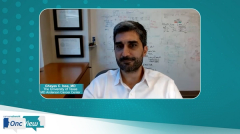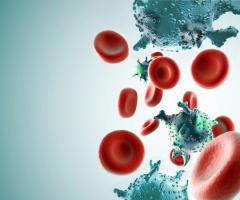
Ongoing Research and Future Perspectives in Relapsed/Refractory AML
Clinical insights on the evolving treatment landscape for patients with relapsed/refractory acute myeloid leukemia, with a focus on ongoing research and unmet needs.
Episodes in this series

This is a video synopsis/summary of an OncView® featuring Ghayas C. Issa, MD.
Issa states menin inhibitors are the most exciting advance in treating KMT2A-rearranged and NPM1-mutant acute myeloid leukemia (AML), with combination strategies offering the greatest potential to improve outcomes. Combining menin inhibitors with standard of care like venetoclax or other targeted therapies such as FLT3 or IDH inhibitors could be impactful, as could combinations with investigational epigenetic regulators. Immunotherapies like antibody-chemotherapy conjugates, NK cells, or bispecific T-cell engagers may also prove promising in AML.
Issa stresses the need for accurate molecular profiling at AML relapse to guide therapy selection. Targeted sequencing is important to check for mutations acquired at relapse, like FLT3, that affect prognosis and treatment options. Fluorescent in situ hybridization testing can detect KMT2A rearrangements potentially missed by standard karyotyping. Other newer biomarkers that may predict menin inhibitor response deserve routine testing moving forward as well.
Menin inhibitors represent the biggest AML advance since venetoclax approval. Single-agent studies for regulatory approval in relapsed/refractory NPM1-mutant and KMT2A-rearranged leukemias are underway. The next step is expanding their reach to other AML subtypes with similar targetable gene expression. Further combining menin inhibitors with venetoclax or hypomethylating agents plus venetoclax shows early promise even in the relapse/refractory setting. Soon this can be taken to frontline treatment, possibly combined with FLT3 inhibitors. Over the next decades, menin inhibitors could transform the treatment landscape for a majority of AML cases.
Video synopsis is AI-generated and reviewed by Cancer Network® editorial staff.
Newsletter
Stay up to date on recent advances in the multidisciplinary approach to cancer.








































